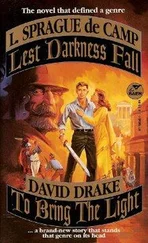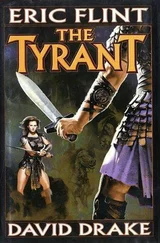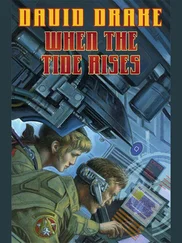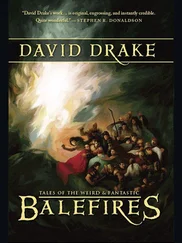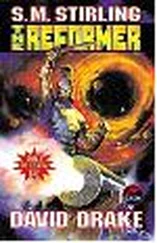David Drake - Fortune's stroke
Здесь есть возможность читать онлайн «David Drake - Fortune's stroke» весь текст электронной книги совершенно бесплатно (целиком полную версию без сокращений). В некоторых случаях можно слушать аудио, скачать через торрент в формате fb2 и присутствует краткое содержание. Жанр: Исторические приключения, на английском языке. Описание произведения, (предисловие) а так же отзывы посетителей доступны на портале библиотеки ЛибКат.
- Название:Fortune's stroke
- Автор:
- Жанр:
- Год:неизвестен
- ISBN:нет данных
- Рейтинг книги:5 / 5. Голосов: 1
-
Избранное:Добавить в избранное
- Отзывы:
-
Ваша оценка:
- 100
- 1
- 2
- 3
- 4
- 5
Fortune's stroke: краткое содержание, описание и аннотация
Предлагаем к чтению аннотацию, описание, краткое содержание или предисловие (зависит от того, что написал сам автор книги «Fortune's stroke»). Если вы не нашли необходимую информацию о книге — напишите в комментариях, мы постараемся отыскать её.
Fortune's stroke — читать онлайн бесплатно полную книгу (весь текст) целиком
Ниже представлен текст книги, разбитый по страницам. Система сохранения места последней прочитанной страницы, позволяет с удобством читать онлайн бесплатно книгу «Fortune's stroke», без необходимости каждый раз заново искать на чём Вы остановились. Поставьте закладку, и сможете в любой момент перейти на страницу, на которой закончили чтение.
Интервал:
Закладка:
David Drake, Eric Flint
Fortune's stroke
Prologue
The best steel in the world was made in India. That steel had saved his life.
He stared at a drop of blood working its way down the blade. Slowly, slowly. The blood which covered that fine steel was already drying in the sun. Even as he watched, the last still-liquid drop came to a halt and began hardening.
He had no idea how long he had been watching the blood dry. Hours, it seemed. Hours spent staring at a sword because he was too exhausted to do anything else.
But some quiet, lurking part of his battle-hardened mind told him it had only been minutes. Minutes only, and not so many of those.
He was exhausted. In mind, perhaps, even more than in body.
In a life filled with war since his boyhood, this battle had been the most bitter. Even his famous contest against one of India's legends, fought many years before, did not compare. That, too, had been a day filled with exhaustion, struggle, and fear. But it had been a single combat, not this tornado of mass melee. And there had been no rage in it, no murderous bile. Deadly purpose, yes-in his opponent as much as in himself. But there had been glory, too, and the exultation of knowing that-whichever of them triumphed-both their names would ring down through India's ages.
There had been no glory in this battle. His overlords would claim it glorious, and their bards and chroniclers give it the name. But they were liars. Untruth came as naturally to his masters as breathing. He thought that was perhaps the worst of their many crimes, for it covered all the rest.
His staring eyes moved away from the sword, and fixed on the body of his last opponent. The corpse was a horror, now, what with the mass of flies covering the entrails which spilled out from the great wound which the world's finest steel had created. A desperate slash, that had been, delivered by a man driven to his knees by his opponent's own powerful sword-stroke.
The staring eyes moved to the stub still held in the corpse's hand. The sword had broken at the hilt. The world's finest steel had saved his life. That and his own great strength, when he parried the strike.
Now, staring at the man's face. The features were a blur. Meaningless. The life which had once animated those features was gone. The man who stared saw only the beard clearly. A heavy beard, cut in the square Persian style.
He managed a slight nod, in place of the bow he was too tired to make. His opponent had been a brave man. Determined to exact a last vengeance out of a battle he must have already known to be lost. Determined to kill the man who led the invaders of his country.
The man who stared-theinvader, he named himself, for he was not given to lies-would see to it that the Persian's body was exposed to the elements. It seemed a strange custom, to him, but that was the Aryan way of releasing the soul.
The man who stared had invaded, and murdered, and plundered, and conquered. But he would not dishonor. That low he would not stoop.
He heard the sound of approaching footsteps behind him. Several men. Among those steps he recognized those of his commander.
He summoned the energy to rise to his feet. For a moment, swaying dizzily, he stared across the battlefield. The Caspian Gates, that battlefield was called. The doorway to all of Persia. The man who stared had opened that doorway.
He cast a last glance at the disemboweled body at his feet.
Yes, he would see to it that the corpse was exposed, in the Persian way.
All of the enemy corpses, he thought, staring back at the battlefield. The stony, barren ground was littered with dead and dying men. Far beyond the grisly sight, rearing up on the northern horizon, was the immense mountain which Persians called Demavend. An extinct volcano, its pure and clean lines stood like some godly reproach to the foul chaos of mankind.
Yes. All of them.
His honor demanded it, and honor was all that was left to him.
That, and his name.
Finally, now, he was able to stand erect. He was very tall.
Rana Sanga was his name. The greatest of Rajputana's kings, and one of India's most legendary warriors.
Rana Sanga. He took some comfort in the name. A name of honor. But he did not take much comfort, and only for an instant. For he was not a man given to lies, and he knew what else the name signified. Malwa bards and chroniclers could sing and write what they would, but he knew the truth.
Rana Sanga. The man-the legend, the Rajput king-who led the final charge which broke the Persians at the Caspian Gates. The man who opened the door, so that the world's foulest evil could spill across another continent.
He felt a gentle touch on his arm. Sanga glanced down, recognizing the pudgy little hand of Lord Damodara.
"Are you badly injured?"
Damodara's voice seemed filled with genuine concern. For a moment, a bitter thought flitted through Sanga's mind. But he dismissed it almost instantly. Some of Damodara's concern, true, was simply fear of losing his best general. But any commander worthy of the name would share that concern. Sanga was himself a general-and a magnificent oneand knew full well that any general's mind required a capacity for calculating ruthlessness.
But most of Damodara's concern was personal. Staring down at his commander, Sanga was struck by the oddity of the friendship in that fat, round face. Of all the highest men in the vast Malwa Empire, Damodara was the only one Sanga had ever met for whom he felt a genuine respect. Other Malwa overlords could be capable, even brilliant-as was Damodara-but no others could claim to be free of evil.
Not that Damodara is a saint, he thought wryly."Practical," he likes to call himself. Which is simply a polite way of saying " amoral." But at least he takes no pleasure in cruelty, and will avoid it when he can.
He shook off the thought and the question simultaneously.
"No, Lord Damodara. I am exhausted, but-" Sanga shrugged. "Very little of the blood is mine. Two gashes, only. I have already bound them up. One will require some stitches. Later."
Sanga made a small gesture at the battlefield. His voice grew harsh. "It is more important, this moment, to see to the needs of honor. I want all the Persians buried-exposed-in their own manner.With their weapons."
Sanga cast a cold, unyielding eye on a figure standing some few feet away. Mihirakula was the commander of Lord Damodara's Ye-tai contingents.
"The Ye-tai may loot the bodies of any coin, or jewelry. But the Persians must be exposed with their weapons. Honor demands it."
Mihirakula scowled, but made no verbal protest. He knew that the Malwa commander would accede to Sanga's wishes. The heart of Damodara' s army was Rajput, unlike any other of the Malwa Empire's many armies.
"Of course," said Damodara. "If you so wish."
The Malwa commander turned toward one of his other lieutenants, but the man was already moving toward his horse. The man was Rajput himself. He would see to enforcing the order.
Damodara turned back. "There is news," he announced. He gestured toward another man in his little entourage. A small, wiry, elderly man.
"One of Narses' couriers arrived just before the battle ended. With news from Mesopotamia."
Sanga glanced at Narses. There was sourness in that glance. The Rajput king had no love for traitors, even those who had betrayed his enemies.
Still-Narses was immensely competent. Of that there was no question.
"What is the news?" he asked.
"Our main army in Mesopotamia has suffered reverses." Damodara took a deep breath. "Severereverses. They have been forced to lift the siege of Babylon and retreat to Charax."
"Belisarius," stated Sanga. His voice rang iron with certainty.
Читать дальшеИнтервал:
Закладка:
Похожие книги на «Fortune's stroke»
Представляем Вашему вниманию похожие книги на «Fortune's stroke» списком для выбора. Мы отобрали схожую по названию и смыслу литературу в надежде предоставить читателям больше вариантов отыскать новые, интересные, ещё непрочитанные произведения.
Обсуждение, отзывы о книге «Fortune's stroke» и просто собственные мнения читателей. Оставьте ваши комментарии, напишите, что Вы думаете о произведении, его смысле или главных героях. Укажите что конкретно понравилось, а что нет, и почему Вы так считаете.

